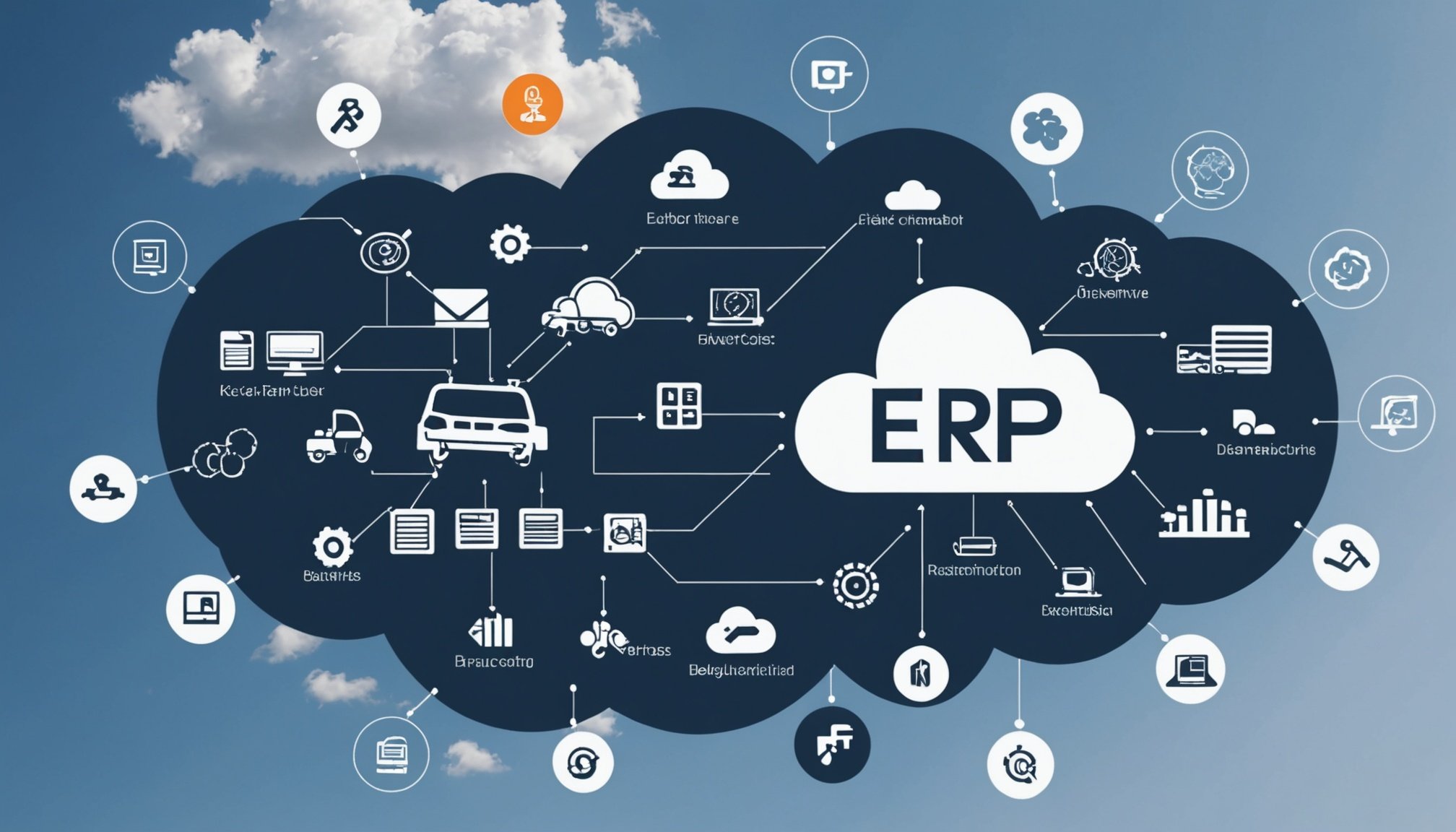Key Elements for Effective Implementation of a Cloud ERP Solution in Manufacturing Businesses in Birmingham
Implementing a Cloud ERP (Enterprise Resource Planning) solution is a significant undertaking for any manufacturing business, especially in a vibrant city like Birmingham. Here’s a comprehensive guide to help you navigate this process successfully.
Understanding the Need for Cloud ERP in Manufacturing
Before diving into the implementation details, it’s crucial to understand why Cloud ERP is essential for manufacturing businesses.
This might interest you : Key considerations for choosing the right crm solution for your uk real estate agency
The Benefits of Cloud ERP
Cloud ERP systems offer several advantages over traditional on-premise solutions, including:
- Scalability: Cloud ERP solutions can easily scale up or down to meet the changing needs of your business.
- Cost-Effectiveness: Reduced upfront costs and lower maintenance expenses make Cloud ERP more budget-friendly.
- Real-Time Data: Access to real-time data enables better decision making and more efficient business processes.
- Accessibility: Cloud-based systems can be accessed from anywhere, at any time, enhancing collaboration and productivity.
Industry-Specific Needs
Manufacturing businesses in Birmingham have unique needs that a Cloud ERP solution must address. These include:
In parallel : Key components for building a successful brand loyalty program for leeds retail chains
- Supply Chain Management: Effective management of the supply chain is critical for timely production and delivery.
- Resource Planning: Accurate planning of resources such as materials, labor, and equipment is essential.
- Inventory Management: Managing inventory levels to avoid stockouts or overstocking is vital.
- Quality Control: Ensuring high-quality products through integrated quality control processes.
Pre-Implementation Preparation
Before starting the implementation process, several steps need to be taken to ensure a smooth transition.
Assessing Current Systems and Processes
- Audit Existing Systems: Evaluate your current ERP systems, if any, and identify areas that need improvement.
- Map Business Processes: Document all business processes to understand how they will be affected by the new system.
- Identify Key Stakeholders: Involve key stakeholders from various departments to ensure everyone is aligned with the project goals.
Choosing the Right ERP Solution
Selecting the right ERP solution is crucial. Here are some factors to consider:
- Industry Expertise: Look for ERP providers with experience in the manufacturing sector, such as WinMan ERP or Odoo[3][5].
- Customization: Ensure the ERP solution can be customized to meet your specific business needs.
- Integration: Check if the ERP system can integrate with other tools and platforms you use, such as your website, POS, and Amazon.
Budgeting and Resource Allocation
- Financial Planning: Allocate a sufficient budget for the implementation, including costs for software, consulting, and training.
- Resource Allocation: Assign a dedicated team for the implementation project, including project managers, IT staff, and end-users.
Implementation Process
The implementation process involves several key steps.
Data Migration
- Data Assessment: Evaluate the quality and integrity of your existing data.
- Data Cleaning: Clean and standardize the data to ensure it is ready for migration.
- Data Migration: Migrate the data to the new Cloud ERP system, ensuring minimal disruption to business operations.
Configuration and Customization
- System Configuration: Configure the ERP system according to your business requirements.
- Customization: Customize the system to fit your specific processes and workflows.
- Testing: Conduct thorough testing to ensure the system works as expected.
Training and Support
- User Training: Provide comprehensive training to all users to ensure they are comfortable with the new system.
- Ongoing Support: Ensure ongoing support is available from the ERP provider, such as 24/7 support from Odoo partners[5].
Change Management
Change management is a critical aspect of any ERP implementation.
Communicating Change
- Clear Communication: Communicate the reasons for the change and the benefits of the new system to all stakeholders.
- Training Programs: Implement training programs to help employees adapt to the new system.
Addressing Resistance
- Addressing Concerns: Address any concerns or resistance from employees by providing clear information and support.
- Involving Employees: Involve employees in the implementation process to make them feel more invested in the success of the project.
Post-Implementation Review and Optimization
After the implementation, it’s essential to review and optimize the system.
Monitoring Performance
- Key Performance Indicators (KPIs): Set up KPIs to monitor the performance of the new system.
- Real-Time Data Analysis: Use real-time data to identify areas for improvement and make data-driven decisions.
Continuous Improvement
- Feedback Loop: Establish a feedback loop to gather input from users and make necessary adjustments.
- Regular Updates: Regularly update the system to incorporate new features and improvements.
Case Study: Successful ERP Implementation in Birmingham
Let’s look at a hypothetical case study of a manufacturing business in Birmingham that successfully implemented a Cloud ERP solution.
Company Background
ABC Manufacturing is a mid-sized manufacturing company in Birmingham that produces automotive parts. They were using an outdated ERP system that was causing inefficiencies in their supply chain and inventory management.
Implementation Process
ABC Manufacturing chose to implement an Odoo ERP solution due to its comprehensive features and industry expertise. Here’s a brief overview of their implementation process:
- Pre-Implementation: They conducted a thorough audit of their existing systems and processes, identified key stakeholders, and allocated necessary resources.
- Data Migration: They cleaned and migrated their data to the new system, ensuring minimal disruption.
- Configuration and Customization: They configured and customized the Odoo system to fit their specific business needs.
- Training and Support: They provided comprehensive training to all users and ensured ongoing support from the Odoo partner.
Results
After the implementation, ABC Manufacturing saw significant improvements in their business processes:
- Improved Supply Chain Management: They were able to manage their supply chain more effectively, reducing lead times and improving delivery rates.
- Enhanced Inventory Management: They achieved better inventory levels, reducing stockouts and overstocking.
- Real-Time Data Analysis: They were able to make better decisions using real-time data, improving overall efficiency and productivity.
Practical Insights and Actionable Advice
Here are some practical insights and actionable advice for businesses in Birmingham looking to implement a Cloud ERP solution:
Engage with Experts
Engage with experts who understand your business and the challenges you face. Events like itSHOWCASE can connect you with industry leaders and specialists who can help you choose the right ERP solution[1].
Plan Thoroughly
Plan the implementation thoroughly, including budgeting, resource allocation, and change management. A well-planned project will reduce the risk of delays and disruptions.
Focus on Training
Focus on providing comprehensive training to all users. This will ensure a smoother transition and better adoption of the new system.
Detailed Bullet Point List: Key Steps in Cloud ERP Implementation
Here is a detailed list of key steps involved in the Cloud ERP implementation process:
-
Assess Current Systems and Processes
-
Evaluate existing ERP systems
-
Document business processes
-
Identify key stakeholders
-
Choose the Right ERP Solution
-
Look for industry expertise
-
Ensure customization and integration capabilities
-
Check for user reviews and case studies
-
Budget and Resource Allocation
-
Allocate budget for software, consulting, and training
-
Assign a dedicated project team
-
Data Migration
-
Assess data quality and integrity
-
Clean and standardize data
-
Migrate data to the new system
-
Configuration and Customization
-
Configure the system according to business requirements
-
Customize the system to fit specific processes and workflows
-
Conduct thorough testing
-
Training and Support
-
Provide comprehensive user training
-
Ensure ongoing support from the ERP provider
-
Change Management
-
Communicate the reasons for the change
-
Address employee concerns and resistance
-
Involve employees in the implementation process
-
Post-Implementation Review and Optimization
-
Monitor system performance using KPIs
-
Use real-time data for decision making
-
Establish a feedback loop for continuous improvement
Comprehensive Table: Comparison of Top Cloud ERP Solutions
Here is a comparison table of some top Cloud ERP solutions that manufacturing businesses in Birmingham might consider:
| ERP Solution | Industry Expertise | Customization | Integration | User Support | Cost |
|---|---|---|---|---|---|
| Odoo | Manufacturing, Distribution, E-commerce | High | Extensive | 24/7 | Variable |
| WinMan | Manufacturing, Distribution, Retail | High | Good | On-site | Variable |
| SAP Business One | Manufacturing, Distribution, Retail | High | Extensive | On-site | High |
| Oracle Cloud ERP | Manufacturing, Distribution, Retail | High | Extensive | On-site | High |
Quotes from Industry Experts
Here are some quotes from industry experts that highlight the importance of effective Cloud ERP implementation:
-
“Choosing the right ERP solution is crucial. It’s not just about the features; it’s about how well the solution fits your specific business needs and processes.” – Liz Anderson, Commercial Finance Director, Leec Limited[1].
-
“A well-planned implementation process is key to the success of any ERP project. This includes thorough data migration, comprehensive training, and ongoing support.” – Expert from itSHOWCASE[1].
-
“Cloud ERP solutions offer real-time data analysis, which is essential for making informed decisions and improving business processes. It’s a game-changer for manufacturing businesses.” – Expert from Target Integration[5].
In conclusion, implementing a Cloud ERP solution in a manufacturing business in Birmingham requires careful planning, thorough execution, and ongoing support. By understanding the key elements involved in this process and following practical advice, businesses can streamline their operations, enhance efficiency, and drive growth.











